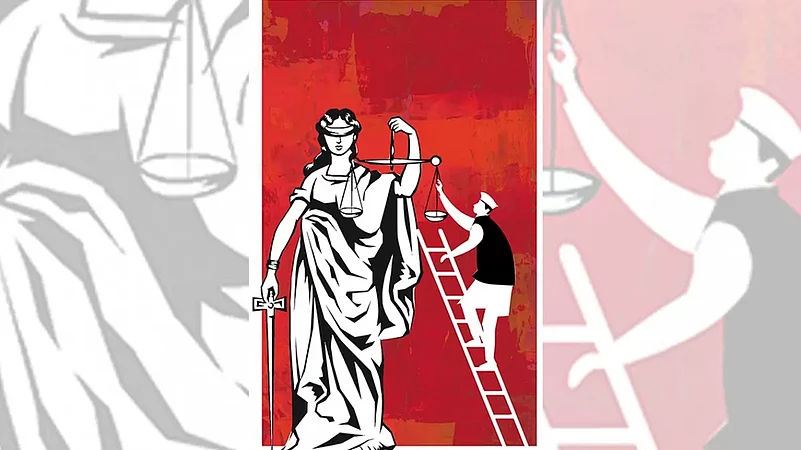The appointment of judges is back in the spotlight. Law Minister Kiren Rijiju made a series of statements questioning the collegium system. Even the Vice President, in his very first address to the Rajya Sabha, questioned the legitimacy of the Supreme Court ruling, which declared the constitutional amendment setting up the National Judicial Appointments Commission (NJAC) as unconstitutional. There was a sharp reaction from the Supreme Court. Questioning the government’s delay in the appointment of judges recommended by the SC collegium, the court observed that the law declared by it is binding on everyone. The court added that comments on the Supreme Court collegium will not be well-received.
The Supreme Court is undoubtedly right in emphasising that it is responsible for enforcing the Constitution and this means the Constitution as interpreted by the court. As long as the 2015 SC ruling upholding the collegium system for appointment of judges holds the field, the government has to follow the recommendations of the collegium. However, the court may not have sought to quell the debate on the appropriate mechanism for appointment of judges. The appointment of judges is far too important a matter to be left to the
judiciary alone.
The issue of appointment of judges is not a new debate. This has troubled our polity right from the time of the framing of the Constitution. The Constituent Assembly also struggled with the issue of who should have the final say when it came to appointment. The judges of the Federal Court (precursor to the present Supreme Court) and the chief justices of various high courts proposed a protocol for appointment. Dr. Ambedkar came out strongly against giving the Chief Justice of India (CJI) a ‘virtual veto’ for the appointment of judges. Finally, in the Constitution, the President was conferred with the power of appointment after consulting with the SC and HC judges.
But this did not close the debate. The SC confronted this issue and had to change its position on the mechanism of appointment of judges not once or twice but thrice. The court itself had to clarify, revise (and in the process, invent) the appropriate mechanism for the appointment of its judges. In 1981, in response to excessive government intervention in the appointment process, the court ruled that consultation with the Supreme Court must be “effective consultation”, but stopped short of saying concurrence is needed. In 1993, the court went the extra mile in holding that any judicial appointment must be preceded by concurrence with the Supreme Court. In 1999, the Court clarified that a collegium of the CJI and the four senior-most judges would recommend the judges to be appointed.
In response to the widely held perception that the Supreme Court had taken over the process of appointment of judges, the Parliament, in a rare and unanimous constitutional amendment ratified by 16 states, proposed a new formula: the appointment and transfer of judges would be done by the NJAC—a six-member constitutional body, comprising the three senior-most judges of the SC, the Law Minister and two eminent persons appointed by a committee comprising the CJI, the prime minister and the Leader of Opposition.
The Supreme Court did not accept this formula. Four judges with one dissenter held that the NJAC formulation violated the independence of the judiciary and directed a reversion back to the collegium system. A unanimous constitutional amendment was annulled.
The Supreme Court’s anxiety to preserve the collegium system is understandable. It is unfair to characterise it as a power grab. The court was a victim of attacks, particularly in the 1970s, in the form of supersession of judges who ruled against the government. Executive involvement in the appointment and transfer of judges in the 1980s represented a frontal attack on the independence of the judiciary.

The Supreme Court played a crucial role in ensuring that India remained a democratic, and largely constitutional, country. Had the court buckled under executive pressure, India may have found it challenging to remain a democratic polity. Using its interpretative power, the court has expanded constitutional protections, made it accessible to the underprivileged and made several institutional interventions to inject accountability. No doubt, the court has often been found wanting, but this only acknowledges the expectations from the institution and the hope that the court would push the state from an elected democracy to a constitutional democracy. When other organs and institutions fail to ensure accountability of the government, the Court is the last resort. All of this could easily be undermined if the executive is allowed to control the appointment of judges and thereby control the court.
Despite the promise that the collegium system will ensure that the best and the brightest are selected, it has not lived up to its expectations. The working of the collegium over the last three decades has raised several concerns and even proponents of the collegium system— former CJI J.S. Verma, who authored the judgement in the Second Judges Case, eminent jurist Fali S Nariman and Justice Kurian Joseph, one of the judges who declared NJAC unconstitutional—have all expressed regret at the functioning of the collegium.
First, there has been no transparency in the functioning of the collegium, often accused of being opaque. Justice Ruma Pal, a former judge of the Supreme Court put it bluntly, “Consensus within the collegium is sometimes resolved through a trade-off resulting in dubious appointments with disastrous consequences for litigants and the credibility of the judicial system.” Such a process is incompatible with the high standards the court demands from other institutions.
Transparency in some form is critical because there is no external oversight on how the court goes about its job. The Court has often demanded that the institutional structure of the government must satisfy the constitutional requirement of separation of powers, which ensures checks and balances. But when it comes to appointments, the Court carves out an exception for itself.
Immediately after the NJAC ruling, the Court attempted to rectify the opaque nature of the system by requiring that the resolutions of the collegium would be published with reasons. However, this effort at transparency did not last very long as the court soon started publishing resolutions sans any reason and the same trend continues to date.
Second, the collegium system does not ensure that there is sufficient scrutiny of the qualification and temperament of the proposed candidate for judicial office. This is critical because, unlike other jurisdictions, judges in India command extraordinary power.
In the United States, extensive scrutiny of judicial nominees is justified due to the vast power conferred on judges. In conducting the scrutiny, the judiciary plays no role. After the president makes a nomination, the American Bar Association constitutes a team of leading lawyers who conduct an extensive peer review on the proposed appointee and evaluate the candidate using three criteria: integrity, professional competence and judicial temperament, culminating in a public rating on whether the candidate is ‘Well Qualified, ‘Qualified or ‘Not Qualified.’ Several other activist organisations also weigh in. All of this information is fed to the Senate Judiciary Committee which confirms the nomination after conducting an extensive hearing. Several nominees who have been proposed by US presidents in the past did not survive the scrutiny.
The US model may not be appropriate in the Indian context, but it highlights the importance of intense scrutiny prior to an appointment. In India, the scrutiny is a closed door process and the bar and public know the name of the judge only after a decision has been made. In contrast, appointment of district judges in India has a high amount of scrutiny. Before a candidate is appointed as a district judge, he or she has to pass a stringent competitive exam. This ensures that the candidate has the baseline technical qualifications.
All of these concerns justify a dispassionate review of the current collegium system. The appropriate course of action would be for the government to engage with the judiciary and come up with a proposal which will satisfy constitutional standards. A modern, democratic, constitutional republic that respects the rule of law requires a strong judiciary. This would be possible without a process which leads to the appointment of an able and diverse set of judges.
(This appeared in the print edition as "Collegium In The Crosshairs")
(Views expressed are personal)
K. Vivek Reddy is a senior advocate practising in the supreme court and the telangana high court


















